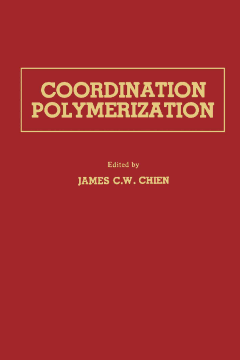
Additional Information
Book Details
Abstract
Coordination Polymerization contains the proceedings of a symposium sponsored by the American Chemical Society and held at the University of California-Los Angeles on April 3, 1974. The papers explore developments in coordination polymerization and cover topics ranging from stereoselection and stereoelection in α-olefin polymerization to heterogeneous Ziegler-Natta polymerization; transition metal alkyl polymerization catalysts; chain transfer in Ziegler-type polymerization of ethylene; and stereospecific polymerization of diolefins by h3-allylic coordination complexes.
This book is comprised of 13 chapters and begins with a discussion on Karl Ziegler's major contributions to the chemistry of free radicals, organo-alkali metal compounds, many-membered rings, and organotransition metallic compounds. The next two chapters focus on the origin of steric control in the polymerization of α-olefins, with emphasis on steroselection and stereoelection as well as the influence of the chirality of the transition metal on the stereoregularity of the resulting polymer. The problem of counting active sites is then addressed, and results obtained with various methods are compared. The mechanisms of initiation, propagation, termination, and transfers in polymerizations by (π-C5H5)2 TiCl2 catalysts are also considered, along with polymerizations by allyl, benzyl, trimethylsilmethyl, and other derivatives of Ti and Zr. The last three chapters examine the kinetics of Ziegler-Natta polymerization; the Langmuir adsorption mechanism; supported Ziegler-Natta catalysts; factors that affect the stereoregularity of polymerization of propylene by supported catalysts; and polymerizations of diolefins to equibinary polymers by h3-allylic coordination complexes.
This monograph will be of interest to chemists as well as polymer scientists and engineers.
